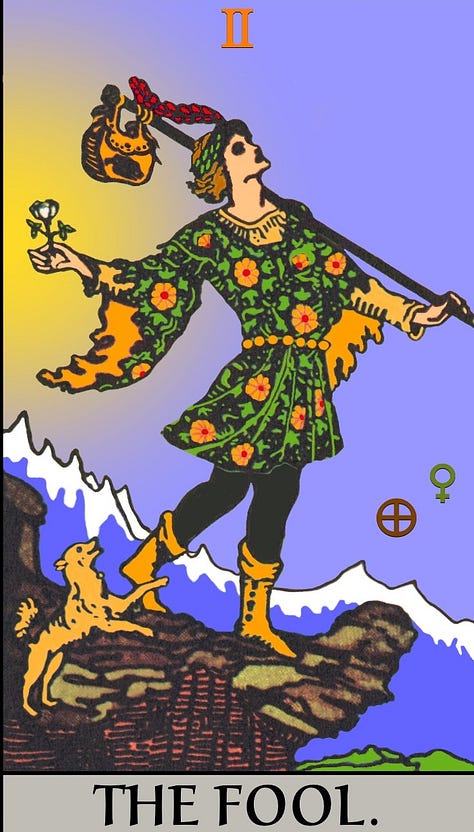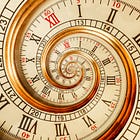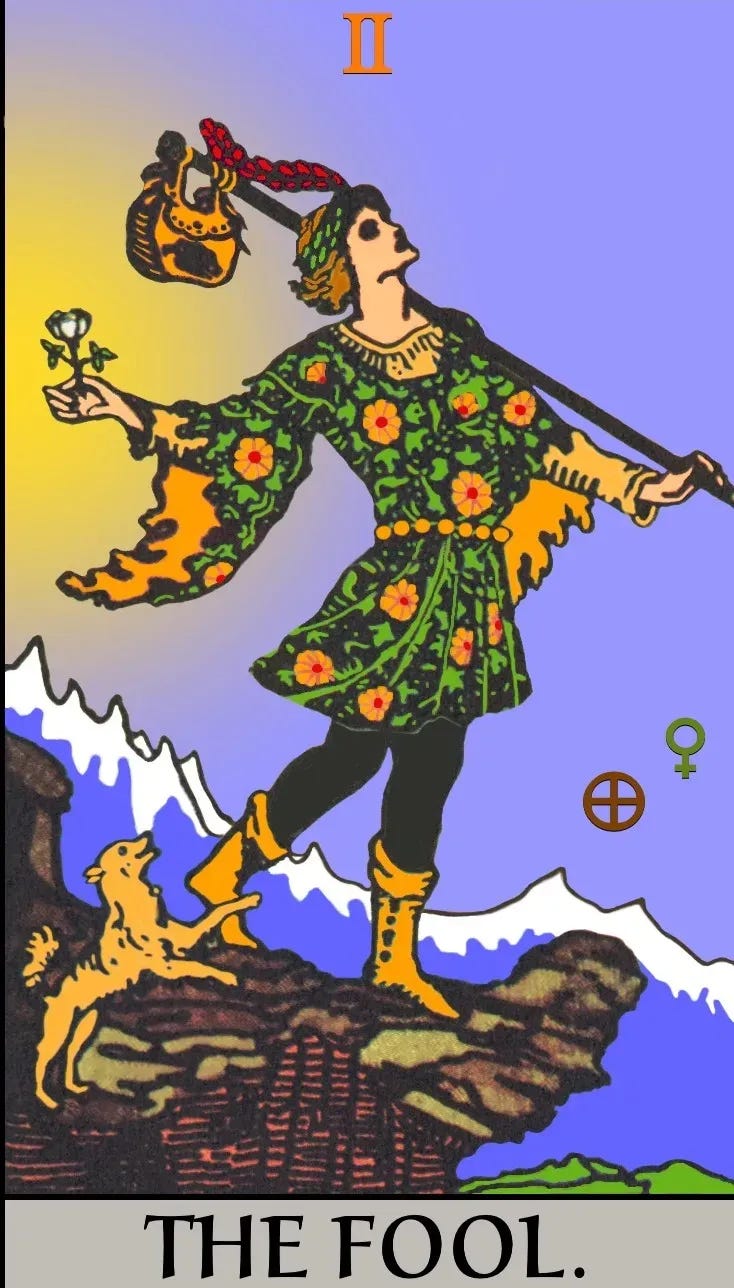Quest for the Elixir
This post is part of an ongoing series. If you’re new to it, you’ll want to read the introduction first (about 6 minutes):



Three Articles About a Chapter of the Universal Story
Each edition of Quest for the Elixir consists of three articles about one of the 12 chapters in the cyclical Universal Story.
The first article is an exploration of the chapter from the perspective of the Hero’s Journey in Joseph Campbell’s monomyth.
The second article is a view of the same chapter in terms of the Zodiac sign corresponding to it in the cycle.
The third article is about the meaning of the chapter as symbolized in a Major Arcana card of the tarot.
During the month of the Sun’s transit through Gemini, we observe the Neighborhood chapter of the Universal Story. In celebration, I offer the following three articles:
The Monomyth: The Call to Adventure
At this stage of the story, the universal hero’s attention is somehow drawn beyond his normal, immediate surroundings into a new frontier of discovery. This step parallels young childhood, when a little one develops and explores some joys of language and locomotion outside his home and around his local neighborhood.
For a young child, to whom walking and talking are fascinating novelties, every local excursion is an adventure in itself. For anyone, a simple encounter or observation of something unusual might lead to an extended adventure into the unknown and some unexpected challenges.
"A hero ventures forth from the world of common day into a region of supernatural wonder. Fabulous forces are there encountered and a decisive victory is won." — Joseph Campbell
The hero is already feeling somewhat restless and ready for something new to happen when the call to adventure comes to him. Whether it’s eagerness for exercise, curiosity, discontent over recent events, or simple boredom, he welcomes opportunities to experience something different.
"The hero’s journey always begins with the call. One way or another, a guide must come to say, 'Look, you’re in Sleepy Land. Wake. Come on a trip. There is a whole aspect of your consciousness, your being, that’s not been touched. So you’re at home here? Well, there’s not enough of you there.' And so it starts." — Joseph Campbell
The call can come in many ways. Words overheard, a message or assignment received, a news item, a conversation, something seen in a book, online or on the street, an encounter with a new person, or any other event might somehow grab the hero’s attention and attract his interest. A wrong may need to be righted, some object may be needed or wanted, someone may need help, or an opportunity for a new relationship or something else desirable may beckon the hero to adventure.
Of course, the call implies some sort of challenge and a question as to the hero’s ability to deal with it. Can the hero successfully right the wrong, supply the needed help, attract the potential companion, or obtain the whatever? Maybe, maybe not. This is a stage of observation. Unless his investigations are interrupted by some outside agent, he’ll have to decide whether or not to pursue them further.
In The Wizard of Oz, Dorothy’s call to adventure comes when Miss Gulch, a dog-hating neighbor, seriously threatens the life of her beloved pet, Toto.
Toto manages to return to Dorothy, but she fears he won’t be safe there at home for long. That’s when it occurs to her to right the wrong by taking Toto on the road in search of a safer place. Girl and dog haven’t walked very far from the farm when they meet another neighbor, this time a friendly one, and stop for a chat.
Gemini
Gemini is one of the three Air signs, all of which reflect modes of thinking. Unlike the other two Air signs (creative Aquarius and harmonious Libra), Gemini is associated with objective facts and connections.
Collection and exchange of information is a basic function of Gemini, so anything that facilitates that function is likely to be found wherever Gemini is. That includes books, papers, and writing materials of all kinds, as well as devices for calculation or communication such as computers and phones.
Means of local transportation are also commonly found around Gemini. They enable one to get around and run quick errands, observe an area to see what’s going on firsthand, or meet and communicate with others face to face. A car or other wheeled vehicle is preferable; otherwise a nearby bus stop or subway station is a must, or at the very least a good pair of walking shoes.
Language is another Gemini thing. People with Gemini strong in their makeup usually love to read, write, and talk. They enjoy words and are often very clever with them. A common Gemini trait is a fondness for puns and other silly word play. Here are a few of my favorite examples:
The Gemini style is youthful, expressive of detail and variety, and rather monkey-like — curious, alert, adaptable, agile, and spry.
“Jack be nimble, Jack be quick, Jack jump over the candlestick.”
— Traditional English Nursery Rhyme
The rising sign in Jack’s natal chart is probably Gemini.
In an astrological chart, houses represent the various ‘departments’ of life, and the places where they function. The natural house of Gemini is the 3rd house, located in the lower left part of the wheel as shown above. A 3rd-house place is anyplace local where information is typically gathered/exchanged and connections made. In a natal chart, the sign on the cusp of the 3rd gives a clue to the style and typical purpose of one’s local commutes and communications.
Physically, the 3rd house includes the yard outside one’s home, the local neighborhood or town, streets, paths and roads, plus such places as libraries, schools, post offices, bus stops and parking lots. A nearby town that’s a reasonably short drive away is still within the 3rd house (but not a distant state or country to which we’d normally travel by train or plane).
We’re in the non-physical 3rd house when we’re making mental connections and gathering info on the phone or internet, for example, or from books, letters, TV or radio.
3rd-house people include siblings and relatives other than parents (convenient but usually more objective) and local people generally, i.e., neighbors.
In the language of astrology, planets function as ‘nouns’ or ‘verbs’ that represent or express the various energies of life. Each sign reflects the qualities of the planet which rules it. While Aquarius is ruled by Uranus of the creative mind, and Libra is ruled by Venus of intuitive, “right-brained” thought, Gemini is ruled by Mercury of logical, “left-brained” thinking.
As a ‘verb’, Mercury’s basic functions are to notice details, make connections among a variety of factors, and sometimes apply acquired knowledge. In an astrological chart, Mercury suggests someone reading, writing, talking, running errands, and/or busy with some sort of detailed work.
Like Venus, Mercury is said to rule two of the signs. Both signs involve knowledge and details. As ruler of Airy Gemini, Mercury functions as learner, a gatherer and sharer of general knowledge. As ruler of Earthy Virgo, Mercury applies knowledge to detailed practical tasks.
While positive Mercury is a force for knowledge and skills to accomplish needed work in the world, like all planets it has a negative side. Negative Mercury is clever, but tends to be shallow, inappropriately inquisitive or critical, and given to unproductive or even destructive mischief (idle gossip, clever ways of cheating, etc.).
Mercurial ‘nouns’ include all objects to do with information, communication (books, papers, phones, etc.), or locomotion/local transportation (cars, buses, subways, etc.), as well as tools and equipment used in skilled and detailed work.
Mercury people are those engaged in any of the various activities associated with Gemini or Virgo. They all work with details and tend to be versatile, often ‘wearing more than one hat’. Mercury types can be ‘walking encyclopedias’, knowing their way around and/or how to do a variety of things. When not in a hurry or busy with a task, Mercury people are usually sociable, loquacious, interesting, and happy to share information in a friendly chat.
The Fool
Under the morning Sun, the young Fool goes walking. Gazing skyward, he is oblivious to his path. Nor is he aware of the objects he carries, which are behind him and out of his view. One of these is a white rose; the other is a stick from which hangs a knapsack bearing an image of an eagle. On his head the Fool wears a laurel wreath with a red feather, and on his body is a houppelande embroidered with flowers. A dog at the Fool’s feet tries frantically to call his attention to the steps he is taking, for he is about to step off the edge of a cliff.
The Fool’s headwear expresses high social status (laurel) and physical strength (red feather). The rich floral pattern of his garment suggests that he comes from a garden, a place of natural wealth, where he was pretty much ‘rooted’ and didn’t get around. He is like a pampered child of nobility who has never known anything but comfort and luxury. The white rose in his hand underscores his innocence and naïveté.
On the other hand (literally), the Fool also carries a wand-like stick that suggests his intuitive connection with the Source. His knapsack contains the hidden burden of his karma or fate: the ‘seeds’ of lessons he has yet to learn. The eagle implies that the Fool can exchange these coin-like contents for experiences that can raise his consciousness. If he should misstep into a regrettable mistake, he’ll pay for his error with a life lesson and hopefully be wiser for the experience.
The dog knows instinctively that the Fool is in imminent danger of some sort of trouble that he’s not prepared to deal with. The Fool is apparently unaware of the dog’s warning.
Will the Fool continue to step forward into a harrowing surprise and learn some lesson the hard way? Or will he heed the dog, think better of his impulse, and change intuitively to a wiser course?
We don’t know what the Fool will do, but what he should do is clear. He’s out to see the sights, but his awareness is superficial. He’s having a nice walk in the sunshine, tasting adventure by getting acquainted with new things, which is natural and good. But there’s only so much out there that he’s ready to deal with. Like a growing young child, he can safely leave his house, but should not wander out of his neighborhood. At some later time, he’ll be ready for more challenging risks in the unknown. But for now, since evidently he’s no wiser than his dog, some limited adventures are enough. Certainly he should turn back from that precipice to avoid a nasty downfall.
In divination, I read the Fool as someone who is enthusiastically exploring new possibilities, but could be unknowingly on the verge of a dangerous mistake.
If it’s reversed, I read it as someone’s instinctive avoidance of an action that feels too risky and unwise.
The Gemini Files
More to enjoy whenever the Sun is in Gemini









